Flags of Countries that Start with B
How many countries beginning with B? There are a total of 18 countries starting with letter B among the 193 countries in the world:.
- Bahamas
- Bahrain
- Bangladesh
- Barbados
- Belarus
- Belgium
- Belize
- Benin
- Bhutan
- Bolivia
- Bosnia and Herzegovina
- Botswana
- Brazil
- Brunei
- Bulgaria
- Burkina Faso
- Burma
- Burundi
Belgium

Belgium is a kingdom in Western Europe. The country has a coast to the North Sea and borders France, Germany, Luxembourg and the Netherlands. The low lying areas along the coast are protected from flooding by dikes. The majority of Belgium is fertile agricultural land. The eastern part is dominated by the wooded mountains, the Ardennes.
There is a temperate coastal climate with mild winters and quite chilly summers.
Belgium has few raw materials, and the deposits of coal and iron ore are gradually depleted.
Belgium has two large population groups, each with its own language, Flemish to the north and Walloon to the south. The country is divided into three regions: Flanders, Wallonia and Brussels. The country’s capital, Brussels, is the seat of both the EU and NATO.
Country Facts – State Capital – Population Graph – Airports – Public Holidays – Embassies of Belgium – Embassies in Belgium – Import Regulations – Major Trade Partners – Major Imports – Major Exports
Bosnia and Herzegovina

Bosnia and Herzegovina is a republic in the Balkan Peninsula of Southeastern Europe. The country lies out to the Adriatic Sea and borders Croatia, Montenegro and Serbia. The landscape is forested and consists mainly of limestone mountains with deep valleys, steep hillsides, rivers and river plains.
The climate is temperate with cold winters and hot summers inland. On the coast, the climate is subtropical.
Agriculture, forestry, hydropower, cattle and sheep farming are essential for the economy. The country also has significant deposits of minerals, among others. iron ore, coal, copper, chromium, manganese, salt and bauxite.
Bosnia and Herzegovina was part of Yugoslavia until 1992. The civil war of 1992-1995 led to a division into a Bosnian-Croat and a Serbian part.
Country Facts – State Capital – Population Graph – Airports – Public Holidays – Embassies of Bosnia and Herzegovina – Embassies in Bosnia and Herzegovina – Import Regulations – Major Trade Partners – Major Imports – Major Exports
Bulgaria

Bulgaria is a republic in the Balkans on the Black Sea. The landscape consists of highlands with plains and mountains, deep canyons, coniferous and deciduous forests and lowland. The Danube is the border with Romania.
Bulgaria has temperate mainland climate in the N and subtropical climate in the S and on the coast
The most important natural resources are coal, zinc, copper and bauxite. Agriculture contributes about a fifth to the country’s economy. Bulgaria’s energy supply is based on coal and nuclear power.
Bulgaria was a communist people’s republic in 1945-1989. The country experienced several economic crises in the 1990s and has been approaching Western Europe since the fall of communism. Bulgaria joined the EU in 2007.
Country Facts – State Capital – Population Graph – Airports – Public Holidays – Embassies of Bulgaria – Embassies in Bulgaria – Import Regulations – Major Trade Partners – Major Imports – Major Exports
Belarus

The Republic of Belarus (Belarus) is an inland state in Eastern Europe. Belarus continues to suffer from the aftermath of a 1986 Chernobyl nuclear disaster in Ukraine. Several large areas are nature parks.
There is temperate mainland climate.
Industry, agriculture, forestry, animal husbandry, fur farming and beekeeping are essential for the economy. The country has only minor deposits of raw materials and minerals. Peat is an important source of energy.
Belarus was a Soviet Union republic in the period 1919-1991, and the country has a Russian minority. The governing body is often criticized for being dictatorial and for violating human rights. In 2014, Belarus and Kazakhstan signed an agreement with Russia on the creation of a new Eurasian Union.
Country Facts – State Capital – Population Graph – Airports – Public Holidays – Embassies of Belarus – Embassies in Belarus – Import Regulations – Major Trade Partners – Major Imports – Major Exports
Bahamas
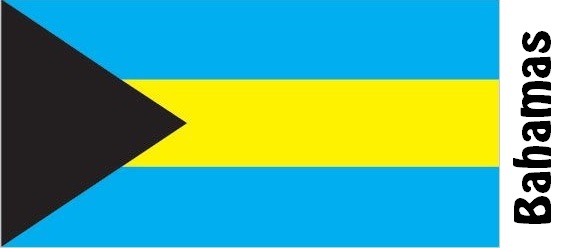
The Bahamas is an archipelago in the Atlantic, NE for Cuba and SE for Florida (USA). The state comprises approx. 700 islands and more than 2400 islets, rocky shores and coral reefs. The islands consist of limestone rocks and are quite flat. There are no streams or rivers. The Bahamas is an island group with limited vegetation.
The climate is tropical, warm and dominated by the northeast pass. Large amounts of rainfall fall in the summer.
The islands’ natural resources are limited. However, oil is a major export commodity.
The Bahamas is one of the richest countries in the Caribbean. Tourism and the financial sector are of great importance to the economy. The archipelago is part of The Commonwealth.
Country Facts – State Capital – Population Graph – Airports – Embassies of Bahamas – Embassies in Bahamas – Major Trade Partners – Major Imports – Major Exports
Barbados
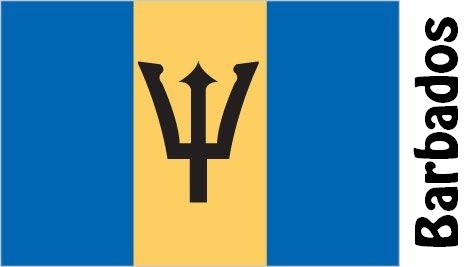
The Kingdom of Barbados is an island state in the Lesser Antilles in the eastern Caribbean. The island consists of coral lime and sandstone and has no rivers. The landscape is fairly flat, though with a ridge in the NE. Barbados is surrounded by coral reefs.
The climate is tropical and characterized by trade winds. Hurricanes occur frequently.
Tourism and the financial sector are the country’s largest sources of revenue. A large part of the island is used to grow sugar cane.
Barbados was formerly a British colony. The country gained independence in 1966, but is still part of The Commonwealth.
Country Facts – State Capital – Population Graph – Airports – Embassies of Barbados – Embassies in Barbados – Import Regulations – Major Trade Partners – Major Imports – Major Exports
Belize

Belize is a kingdom on the Yucatán Peninsula in Central America. The country is off to the Caribbean Sea of Mexico and Guatemala. The landscape consists of flat coastal areas with mangrove forests and swamps, limestone areas, rainforest and the Mayan mountains. Coral islands off the coast form a large reef.
The climate is tropical and characterized by the northeast pass.
The economy is mainly based on tourism and export of sugar cane, citrus fruit and bananas. The country has few natural resources.
Belize was formerly a British colony. The country was called British Honduras until 1973. Today Belize is part of The Commonwealth.
Country Facts – State Capital – Population Graph – Airports – Public Holidays – Embassies of Belize – Embassies in Belize – Import Regulations – Major Trade Partners – Major Imports – Major Exports
Bermuda

Bermuda is an island group in the Atlantic Ocean east of the United States. Bermuda consists of 150 coral islands, only 20 of the islands are inhabited. The coral reefs of the islands rest on a volcano, and the soil is calcareous and porous. The landscape is lush, however, there are no real streams on the islands.
The climate is subtropical, humid, mild and pleasant. Strong winds are frequent in winter.
Tourism and offshore business are key to the economy. Bermuda is one of the richest communities in the world.
Bermuda is a British colony of local government.
Country Facts – State Capital – Airports – Public Holidays – Embassies in Bermuda – Import Regulations – Major Imports – Major Exports
Bolivia
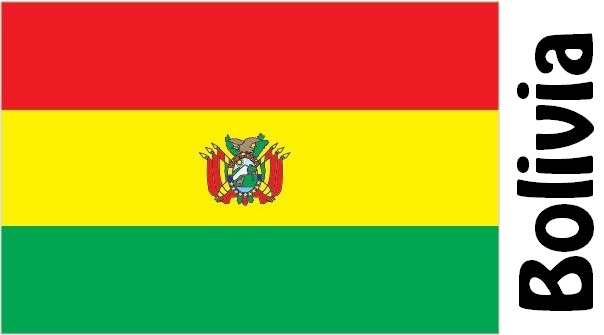
Bolivia is a republic in South America. The country is surrounded by Brazil, Paraguay, Argentina, Chile and Peru. IV the landscape consists of the Andes and the high plateau, Altiplano, with dry salt lakes and plains. The rest of Bolivia is lowland with Amazon rainforest and grassland. On the border with Peru lies the large Titica lake.
The climate is tropical in the lowlands. It is cold, sunny and quite dry in the mountains. Floods occur in the NE.
The country’s most important natural resources include tin, zinc, silver, gold, lead, tungsten, copper, iron, timber, oil and natural gas. In addition, unofficial coca leaves are grown and exported.
Bolivia is one of the poorest countries in South America, and has for several periods been characterized by great economic and political turmoil.
Country Facts – State Capital – Population Graph – Airports – Public Holidays – Embassies of Bolivia – Embassies in Bolivia – Import Regulations – Major Trade Partners – Major Imports – Major Exports
Brazil
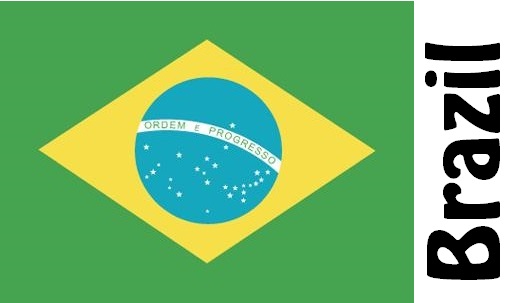
Brazil is a republic in eastern South America out to the Atlantic Ocean. The country is the world’s fifth largest and represents almost half of the continent.
The landscape consists of mountains, hilly upland vegetation with savanna, the world’s largest tropical rainforest area in the lowlands around the Amazon, plateaus of deciduous forests and savanna, swampy lowlands and fertile plains.
The climate is tropical. It is dry in the highlands of the NE and very humid in the Amazon rainforest.
Brazil is very rich in natural resources. The most important are oil, bauxite, gold, iron, manganese, nickel, copper, tin, uranium, hydroelectric and timber. Agriculture employs about 1/4 of the working population. Coffee is mainly grown and exported.
Country Facts – State Capital – Population Graph – Airports – Public Holidays – Embassies of Brazil – Embassies in Brazil – Import Regulations – Major Trade Partners – Major Imports – Major Exports
Benin
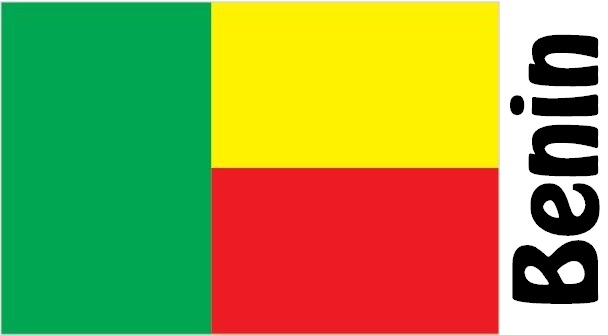
Benin is a republic in West Africa. The country lies on the Gulf of Guinea and borders Burkina Faso, Niger, Nigeria and Togo. The land consists of a broad swampy plain on the coast, savannah and sandstone plateau in the N, Atakora mountains in NV as well as lakes, rivers and forest. The population is composed of more than 40 ethnic groups.
The climate is tropical with a rainy season in N and two rainy seasons in S on the coast.
Agriculture employs over half of the working population. The most important natural resources are limestone and gravel. The country receives energy from a hydroelectric power plant on the Mono River.
French colony until 1960. Benin is now one of the most stable democracies in Africa, but suffers from poor housing and health conditions.
Country Facts – State Capital – Population Graph – Airports – Public Holidays – Embassies of Benin – Embassies in Benin – Import Regulations – Major Imports – Major Exports
Botswana

Botswana is a republic in southern Africa. The country is surrounded by Namibia, Zimbabwe and South Africa. The landscape is dominated by the Kalahari Desert. There are also shrubs and swamps, especially the inland delta Okavango Swamps. There are also several wildlife reserves and national parks.
The climate is subtropical and quite dry. Precipitation falls especially in the period March-November.
The most important natural resources are diamonds, nickel and copper. In addition to minerals, agriculture is also important for the country’s economy.
British colony until 1966. The country was previously one of Africa’s poorest countries, but has experienced strong economic growth. Botswana has a stable democracy and a rising standard of living. However, about 1/3 of the population is infected with HIV or has developed AIDS.
Country Facts – State Capital – Population Graph – Airports – Public Holidays – Embassies of Botswana – Embassies in Botswana – Import Regulations – Major Trade Partners – Major Imports – Major Exports
Burkina Faso

Burkina Faso is a republic in West Africa. The country is an inland state and lies between Ivory Coast, Ghana, Mali, Niger, Benin and Togo. The landscape is fairly flat and consists of a bedrock plateau intersected by rivers, sandstone plateaus in the SV, steep slopes in the island and the lake and dry savanna in the N. About 1/5 of the land area is covered by forest.
The climate is tropical. There are irregular rainy seasons and long periods of drought.
The majority of the working population are employed in agriculture. The country has small deposits of gold and phosphate.
Burkina Faso is one of the poorest countries in the world and is highly dependent on financial assistance from other countries. The country was until 1960 a French colony.
Country Facts – State Capital – Population Graph – Airports – Public Holidays – Embassies of Burkina Faso – Embassies in Burkina Faso – Import Regulations – Major Imports – Major Exports
Burundi
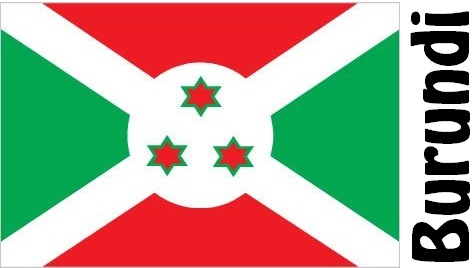
Burundi is a republic in Central Africa. The country is an inland state with borders to Congo (Democratic), Tanzania and Rwanda. The landscape is mountainous and consists of highlands, hills and savanna. There is only limited forest left. The land is on Lake Tanganyika.
The climate is tropical. There are two rainy seasons.
The majority of the working population are employed in agriculture. Coffee and tea are mainly exported. The country’s natural resources are not utilized.
German and later Belgian colony until 1962. Burundi is a poor country suffering from illiteracy, disease and ravaged by violent and bloody conflicts between the two largest ethnic groups, Tutsis and Hutus. The country depends on financial assistance from other countries.
Country Facts – State Capital – Population Graph – Airports – Public Holidays – Embassies of Burundi – Embassies in Burundi – Import Regulations – Major Trade Partners – Major Imports – Major Exports
Bahrain

Bahrain is a kingdom of about 35 islands. The archipelago is located in the Gulf of Persia, between Saudi Arabia and Qatar. The islands are low, rocky and surrounded by coral reefs. The majority of the country is desert.
The climate is tropical and dry with mild winters and very hot summers.
In the past, agriculture and pearl fishing were of great importance to the country. Today, however, oil and natural gas are the most important natural resources.
Bahrain has a high standard of living and a strong economy. The population distribution is very skewed, with men of working age being strongly over-represented. This is mainly due to imported labor from Asia.
Country Facts – State Capital – Population Graph – Airports – Public Holidays – Embassies of Bahrain – Embassies in Bahrain – Import Regulations – Major Imports – Major Exports
Bangladesh

Bangladesh is a republic in South Asia. The country is located on the Bay of Bengal with borders to India and Burma (Myanmar). The terrain consists of lowland with river plains and deltaic areas by the great rivers Ganges and Brahmaputra, mangrove forests and swamps as well as wooded ridges and mountains in the lake.
The climate is tropical with mild, dry winters and hot summers with very large amounts of rainfall (monsoon rain). Floods, hurricanes and other natural disasters are ravaging the country.
Agriculture is the dominant profession and over 2/3 of the land is cultivated. Other essential natural resources are oil, natural gas and fish.
Bangladesh, formerly East Pakistan, separated from Pakistan in 1971. Bangladesh is one of the poorest countries in the world.
Country Facts – State Capital – Population Graph – Airports – Public Holidays – Embassies of Bangladesh – Embassies in Bangladesh – Import Regulations – Major Imports – Major Exports
Bhutan

Bhutan is a kingdom in the Eastern Himalayas in South Asia. The country is an inland state between China and India. The country is mountainous with fertile plains and valleys central to the country. IS lowlands, slopes, forest and savanna.
The climate varies from alpine and cold in N to tropical and warm in S. There is more temperate with cold winters and hot summers in the middle of the country.
Agriculture and cattle farming employs about half of the working population. The export of electricity (hydropower) is a major source of revenue. The other natural resources are used to a limited extent.
Bhutan is one of the poorest countries in the world and relies heavily on financial aid. The country has annual allowances for tourists.
Country Facts – State Capital – Population Graph – Airports – Public Holidays – Embassies of Bhutan – Embassies in Bhutan – Import Regulations – Major Trade Partners
Brunei

Brunei is a sultanate in Southeast Asia. The country is located on the northwest coast of Borneo on the South China Sea and Brunei Bay. Brunei consists of two enclaves that are physically separated from Malaysia. Most of the country is covered by rainforest. IV there is hilly lowland and a narrow, swampy coastal plain. In the island there is more mountainous.
The climate is tropical, warm and humid with a great annual rainfall.
Oil and gas are the country’s most important natural resources. Oil and gas production contributes to over half of GDP and accounts for over 90% of export revenue.
Brunei is one of the richest countries in the world and has a relatively well-developed welfare system. The Sultan formally owns the large national wealth.
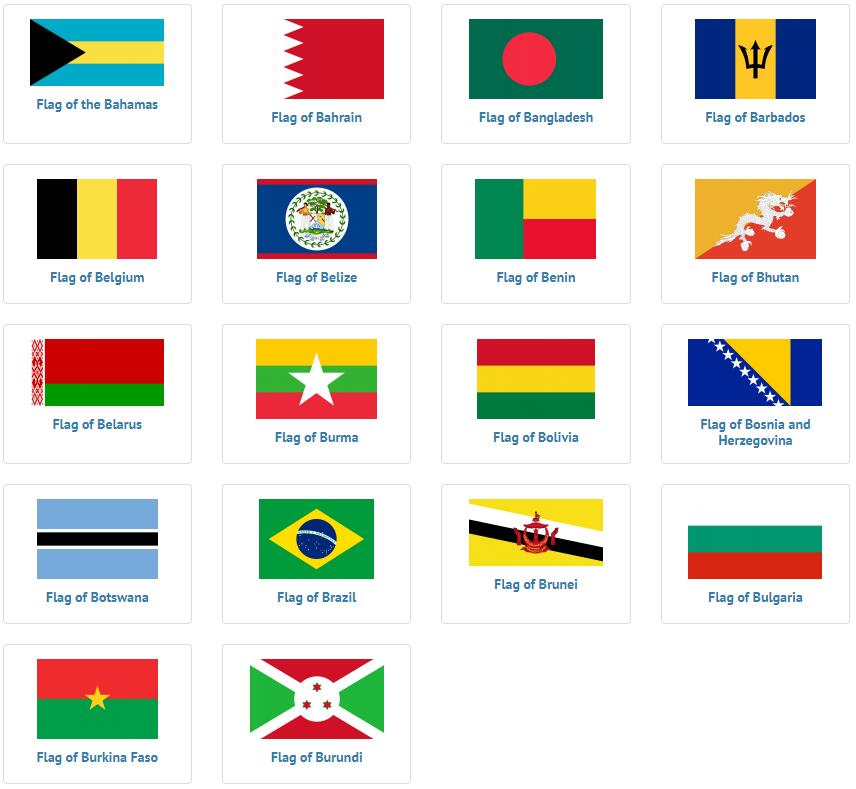
Country Facts – State Capital – Population Graph – Airports – Public Holidays – Embassies in Brunei – Import Regulations – Major Imports – Major Exports













































